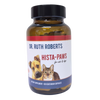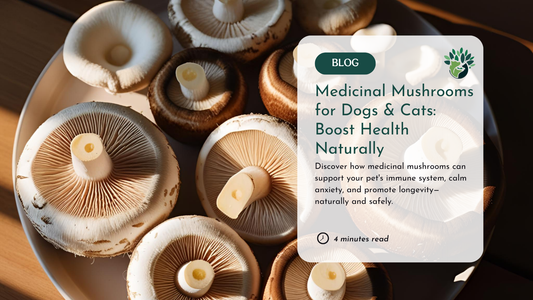As winter approaches, pet owners must consider how to keep their furry companions safe and comfortable during the colder months. From preparing cozy spaces indoors to protecting pets outdoors, ensuring their wellness during winter involves mindful care. Dr. Ruth Roberts and Kat Johnston, LVT, Holistic Pet Health Coach, shared insights on common challenges and holistic solutions for winter pet care. Here’s a comprehensive guide to help you navigate winter wellness for your pets.
Shelter and Warmth for Outdoor Pets
For pets that spend more time outdoors, it’s crucial to provide proper shelter.
- Insulated Shelters: Use sturdy, insulated structures with raised floors to keep your pet off the cold ground.
- Bedding: Add blankets or straw to ensure they stay warm and dry.
- Prevent Freezing Water: Invest in a water heater for bowls to keep fresh water available at all times.
Dr. Kat Johnston suggested creative solutions for outdoor cats, like making shelters from plastic boxes or milk crates, ensuring pets can escape the chill.
Keeping Indoor Pets Cozy
Even indoor pets can feel the chill, especially in homes where heating is kept low.
- Comfy Beds and Blankets: Provide thick, soft bedding in a warm spot away from drafts.
- Sweaters and Booties: Small breeds, senior pets, and those with short coats can benefit from extra layers, even indoors.
- Temperature Considerations: Some pets may need additional heating options, like self-warming mats that only activate when pets lie on them.
Pets like small dogs or older animals often need extra help staying warm. Dr. Roberts noted her own dog, Haya, already had her sweater on when the weather turned cooler.
Protecting Paws from Winter Hazards
Cold surfaces, snow, and de-icing salts can harm your pet’s paws.
- Booties: These are ideal for keeping paws protected. Kat Johnston recommends practicing indoors with treats and positive reinforcement to help pets get used to wearing them.
- Rinse Paws After Walks: If booties aren’t an option, rinse paws with warm water and dry them thoroughly to prevent irritation.
- Moisturize: Use paw balms or salves like calendula or CBD-based options to soothe and protect cracked pads.
Did you know that much of the salt used for sidewalks is a byproduct of the fracking industry and may contain harmful contaminants? Rinsing paws isn’t just for comfort—it’s a safety measure too.
Signs Your Pet Is Feeling the Chill
Pets may not always shiver when they’re cold. Look for these signs:
- Curling into a ball or hunkering down.
- Lifting paws during walks, indicating discomfort.
- Runny noses, watery eyes, or mild coughing from the cold air.
- Dilated pupils or changes in breathing patterns.
Dr. Johnston highlighted that pets, much like humans, can have unique ways of expressing discomfort in the cold, making it vital to observe them closely.
Supporting Joint Health in Cold Weather
Cold weather often aggravates arthritis or joint issues in pets.
- Warm Bedding: Heated mats or well-padded beds can reduce joint stiffness.
- Anti-inflammatory Foods: Incorporate turmeric or omega-rich foods like mackerel into their diets.
- Supplements: Consider medicinal mushrooms, glucosamine, or CBD for joint support.
Dr. Roberts mentioned that PEMF pads, potentially with added heating elements, could provide extra relief for pets with chronic joint pain during winter.
Managing Winter Illnesses
Respiratory issues can increase during the colder months.
- Boost Immunity: Use supplements like probiotics, medicinal mushrooms, or Standard Process products like Enteric or Dermal Support.
- Humidifiers: Keep indoor air moist to prevent nasal and respiratory irritation.
- Nebulizers and Coupage: For pets with coughs or mucus, techniques like nebulizing and gentle chest tapping (coupage) can help break up mucus.
Kat Johnston shared her experience teaching pet parents how to use these techniques effectively at home, emphasizing the importance of early intervention to prevent severe illnesses like pneumonia.
Safe Diet Adjustments for Winter
Nutrition plays a critical role in keeping pets healthy during the colder months.
- Warm Foods: Opt for warming foods like squash, sweet potatoes, and lean proteins such as chicken or beef.
- Avoid Overfeeding: While pets may need slightly more calories in the cold, avoid excess to prevent winter weight gain.
- Anti-inflammatory Additions: Incorporate turmeric or medicinal mushrooms to keep inflammation down and immunity up.
Kat Johnston emphasized the importance of using balanced, fresh diets, like the CrockPET Diet, to optimize pet health year-round.
Managing Cracked and Sore Paws
Winter conditions can lead to painful cracks in your pet’s paw pads.
- Epsom Salt Baths: Use these to soothe and clean cracked paws after walks.
- Moisturizing Salves: Products like Nourish CBD Salve or calendula ointment can help heal and protect irritated skin.
- Preventive Waxes: Apply paw waxes like Musher’s Secret before walks to shield paws from salt and ice.
Pets will naturally lick at their sore paws, making early intervention and prevention crucial to avoid further irritation or ingestion of harmful substances like de-icing salt.
Staying Active During Winter
Exercise is vital for your pet’s physical and mental health, even in winter.
- Indoor Play: Use toys, puzzles, and indoor fetch to keep pets engaged.
- Outdoor Walks: Keep walks shorter in extreme cold, but maintain regular outings for mental stimulation.
A lack of sunlight and activity during winter can weaken your pet’s immune system, making consistent exercise and fresh air essential.
Holistic Support for Overall Wellness
Dr. Roberts and Kat Johnston both advocate for an integrative approach to pet care, balancing conventional medicine with holistic practices.
- Medicinal Mushrooms: Products like Five Defenders or Vitality by MycoDog provide immune support.
- Natural Remedies: Calendula, turmeric, and medicinal herbs can complement dietary changes.
- Health Coaching: Holistic Pet Health Coaches offer guidance for pet parents to implement these strategies effectively.
By incorporating these holistic measures, pet parents can minimize reliance on pharmaceuticals and create a healthier, more balanced lifestyle for their furry friends.
Final Thoughts
Winter wellness isn’t just about keeping pets warm—it’s about maintaining their overall health. Through a combination of proper shelter, supportive diets, and immune-boosting care, pet parents can ensure their companions thrive throughout the colder months.
For additional support, explore Dr. Ruth Roberts’ wellness bundles, tailored to address joint pain, itchy skin, tummy troubles, and more. By preparing for winter proactively, you can keep your pets safe, happy, and healthy all season long.















